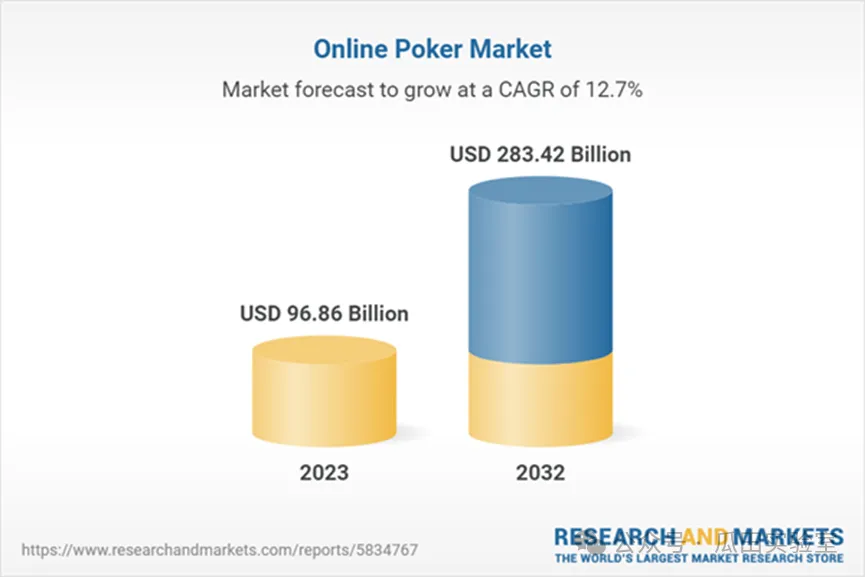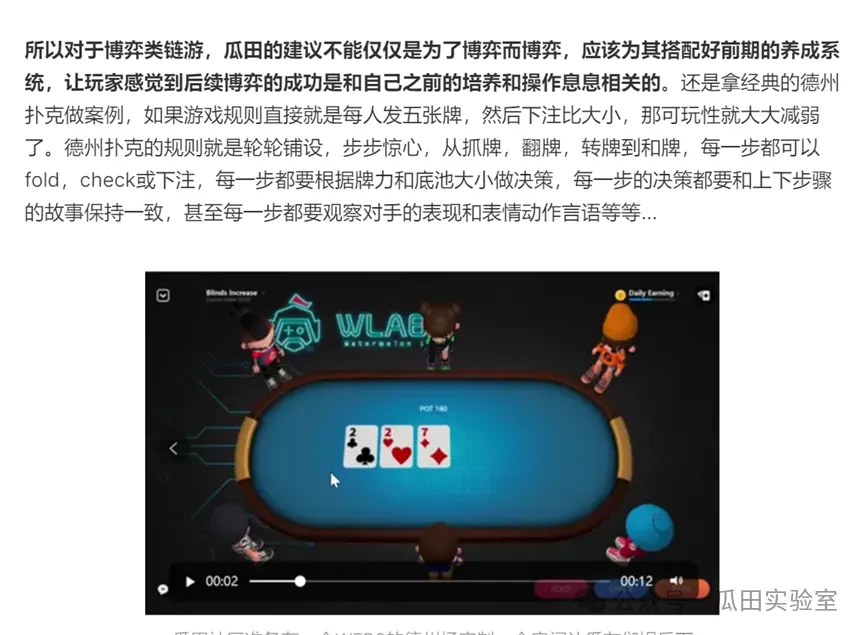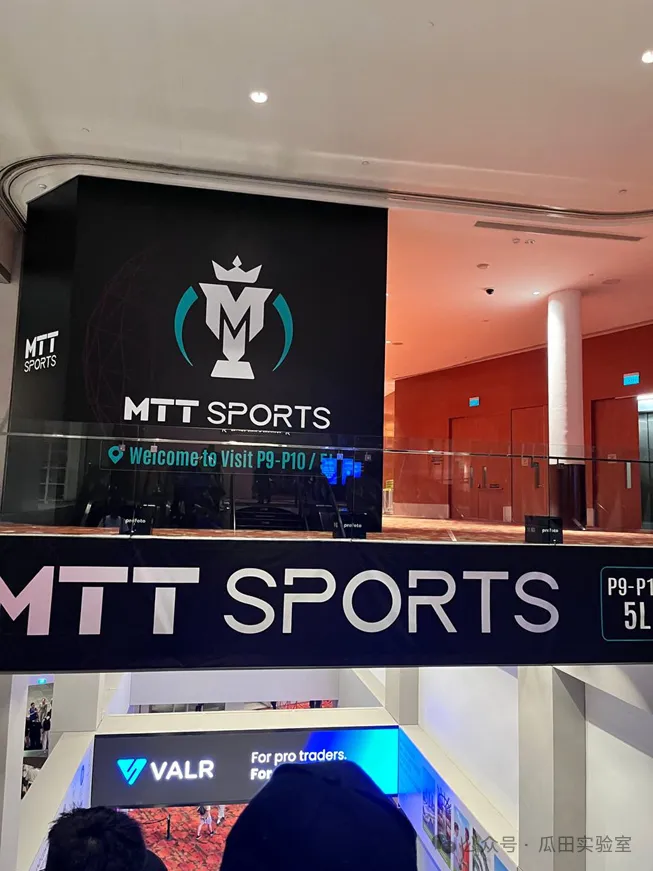Exploring the Combination of Blockchain and Texas Hold'em
Author: Guage

Recently, I reviewed a 100-page report written by Research And Markets.com last year, analyzing the current state and future development of the online poker market. The report predicts that by 2032, the global online poker market size will reach $283.4 billion, while the current market size is approximately $96.8 billion.

Texas Hold'em is the largest segment of competitive online poker, with other variants like Omaha being significantly smaller. Therefore, this article will specifically analyze the necessity and practical cases of combining competitive online Texas Hold'em with WEB3. Online Texas Hold'em is further divided into two categories: cash games and tournaments. Cash games are the type often played at offline gatherings, where players can buy in multiple times. Currently, cash game Texas Hold'em is mostly classified as gambling internationally, while tournament-style Texas Hold'em has been recognized as an electronic sports competition in many countries and regions, such as Germany, the UK, Switzerland, and several states in the US. The Taiwan region of Southeast Asia has also clearly established laws supporting Texas Hold'em tournaments as a form of esports.
To be honest, I have been playing Texas Hold'em for over a decade, but I am more of a casual player with a poor skill level, so my addiction isn't strong. However, I have done a lot of theoretical research, buying several books to take notes and watching countless Texas Hold'em videos. I never expected that online Texas Hold'em would be a billion-dollar business. After entering the crypto space, I found that the proportion of friends playing Texas Hold'em in this circle is not less than that in the financial sector, for several reasons:
First, although Texas Hold'em involves skill and psychology, the underlying elements of gambling and luck are fundamental factors that attract players.
Second, those who can thrive in this circle are either proficient in numbers or social butterflies, making Texas Hold'em particularly suitable for these two types of people.
Third, crypto enthusiasts often face boredom in front of their computers, and having an easy-to-access online game as a social tool enhances emotional value.
Thus, the user profiles in the crypto space and the player attributes of Texas Hold'em can overlap significantly. It is no wonder that after engaging more with the WEB3 Texas Hold'em community, we have discovered that many top players frequently appearing in high-stakes cash games on platforms like WPTpoker or Hustler are actually big shots in the crypto world…
If the alignment of user characteristics between the two circles were the only narrative, it wouldn't be compelling enough to keep W Labs researching "crypto + online Texas Hold'em" for so long. Friends of W Labs should know that in our second lengthy research article in mid-2022 titled "The Future Path of GameFi Chain Game Economic Models" (https://mirror.xyz/0x5c15d8bE6A1dcb715d998d60ed06732f71DCf432/PZscW7w1sbaOdXRUriLYZy8NZKYHH9cb8alShek4Lyc), we specifically used Texas Hold'em as an example to illustrate what types of games are suitable for becoming chain games.

Looking back at that article, we argued that the best chain games should be easy to pick up and thrilling, similar to Texas Hold'em, but we did not analyze how integrating the main characteristics of blockchain into online Texas Hold'em could fundamentally improve certain aspects of the original industry.
W Labs partner Huige wrote an article at the end of 2022 titled "Comparative Analysis of Texas Hold'em GameFi Games" (https://mirror.xyz/0x5c15d8bE6A1dcb715d998d60ed06732f71DCf432/PbYqPxB7EuRBs3AGuVxIokA8KmgtyZ2QFAYoDUxxEM4), which touched on some potential changes that blockchain technology could bring to online Texas Hold'em. The reason we wrote that article was actually a byproduct of providing economic model consulting for a WEB3 Texas Hold'em project, where we simply documented some thoughts. The article briefly mentioned the convenience of payments and the transparency of dealing, both of which can be improved using blockchain technology. Two years have passed, and it is gratifying to see that some of these points are already being developed and validated.
Two years later, the WEB3 industry has experienced ups and downs, with practitioners coming and going. After personally experiencing the frustration of "it's all a bubble," we have become more focused on researching projects that could leverage the characteristics of blockchain to change a WEB2 industry or product, even if it's just a small change, it feels more reassuring than the Ponzi model of "I know it will collapse, but I believe I can run faster than others." Thus, in the currently sluggish market, we have selected some tracks or products to closely follow and analyze, hoping to see them develop long-term in the future, with online Texas Hold'em being the first target we identified.
(1) How Blockchain Technology Can Change Online Texas Hold'em
Blockchain technology can completely address some pain points in the online Texas Hold'em space, which has become a consensus among many teams involved in blockchain Texas Hold'em. We will systematically elaborate on this next.
1.1 How to Prove No Cheating in Dealing: Transparency of Dealing
I remember when I first started playing online Texas Hold'em, an old classmate who was running private online Texas Hold'em games kindly advised me: "Never play big online; the cards can be manipulated." It makes sense, as a centralized dealing program can be easily adjusted by the platform's scientists. So later, when I felt the urge to play, I only played small games on Pokerstars, because Pokerstars is the largest globally, and it wouldn't need to do anything malicious for small players like us. However, it still has the capacity to do harm! This is similar to centralized institutions in the crypto space, which constantly balance their brand value against the profits of wrongdoing. For example, if you stored hundreds of millions of U in a certain platform, would they not consider doing something shady to misappropriate some of your funds in a cash flow crisis? This doesn't challenge human nature.
If dealing were conducted using a protocol for random dealing, recorded on an immutable blockchain, and everyone could confirm these records were not manipulated through Zero-Knowledge Proof (ZKP), it would perfectly solve the transparency issue in Texas Hold'em dealing. Zero-Knowledge Proof is a powerful concept in cryptography, and Yao Qizhi, an academician from Tsinghua University's Yao Class, is an expert in this field. It allows one to prove the authenticity of a statement without revealing any specific information about it.
Some say that many excellent online Texas Hold'em platforms now use Random Number Generators (RNG) instead of simple card shuffling mechanisms, which ensures fairness in dealing, right? I am not technically savvy, so I consulted some coding experts, and the conclusion is: RNG varies in design quality and is still under centralized control. Even if the RNG process itself is fine, the input and output can still be manipulated. Therefore, if we consider RNG as "Cheating Prevention System V1," then the combination of blockchain's ZKP and RNG can be termed "Cheating Prevention System V2."
How to embed Zero-Knowledge Proof into the Texas Hold'em dealing system without affecting the smoothness of dealing and player experience has been a focus of various teams over the past two years, and it is costly. However, I believe this is the most fundamental aspect where blockchain technology can change the online Texas Hold'em space. With this foundation, other improvements can be built upon it.
1.2 How to Prevent Collusion and Account Farming: Fairness for Players
It is impossible to completely eliminate collusion and account farming in online Texas Hold'em; human greed is insatiable. What project teams can do is: continuously increase the cost of cheating for colluding players and account farmers without significantly affecting the experience of legitimate players.
The WEB3 Texas Hold'em projects we have played have various methods to combat collusion and account farming, mainly reflected in their rules. For example, some projects have cash games where only administrators can send links to invited members, and the link becomes invalid after one use; another example is MTT Sports, which has the highest reward incentives (they held a big event at Token2049 in Singapore because the official competition starts in October, offering 1 BTC as a prize every week, totaling 100 BTC for global Texas Hold'em experts to claim), abandoning the cash game business model to focus solely on competitive tournaments, where higher-level competitions require higher identity verification and face verification, and players are randomly assigned to different tables during the competition.

Blockchain technology can improve this aspect by analyzing player big data recorded on the blockchain to determine which accounts are colluding or farming, and then take action. If players disagree, they can appeal, as all previous actions are recorded on the blockchain.
1.3 How to Protect Fund Security: Decentralized Wallets
If Texas Hold'em players still remember how Full Tilt Poker, which was once very popular over a decade ago, went bankrupt, they would wholeheartedly support the introduction of decentralized wallets in the blockchain.

Full Tilt Poker was the second-largest platform after Pokerstars, even endorsed by poker legend Ivey, but the centralized system led the team to lose $400 million of player deposits, leaving only $60 million, causing many players to lose everything.
Such incidents are quite common in the crypto space; the FTX incident is a replica of Full Tilt Poker. If online Texas Hold'em could allow players to log in using decentralized wallets, with their main assets stored in these wallets, the project team would have no authority to access those assets, while only a small amount of funds would be kept in a centralized account to facilitate game processes. Even if the project runs away, the vast majority of assets would still remain in the players' wallets.
1.4 Convenience of Circulation and Payments: Automatic Cross-Border Contract Settlement
Long ago, when I played on Pokerstars, I could only find sellers on certain platforms to recharge my account, a bizarre business model that existed due to circulation barriers. What if a region doesn't have such platforms? The final benefit that blockchain brings to online Texas Hold'em is: as long as there is internet access, players can acquire entry chips, and the rewards are automatically settled through contracts embedded in the game rules. If they want to cash out, they can do so through WEB3 withdrawal channels.
In this article, we summarized how blockchain can change several inherent characteristics of WEB2 "online Texas Hold'em," directly addressing pain points that users suffer from but have to accept in WEB2 online Texas Hold'em projects. Projects that combine blockchain technology to create a chemical reaction can help the team, investors, and users establish a slightly longer-term consensus: that this project is at least making efforts to change some existing unreasonable phenomena. In the next article, we will discuss some actual WEB3 Texas Hold'em project cases in detail.
To be continued.
免责声明:本文章仅代表作者个人观点,不代表本平台的立场和观点。本文章仅供信息分享,不构成对任何人的任何投资建议。用户与作者之间的任何争议,与本平台无关。如网页中刊载的文章或图片涉及侵权,请提供相关的权利证明和身份证明发送邮件到support@aicoin.com,本平台相关工作人员将会进行核查。




